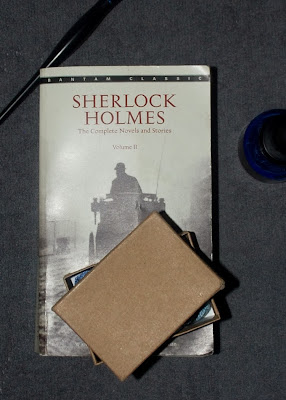Wednesday, December 18, 2013
The best bits in one book
"The friends of Mr. Sherlock Holmes will be glad o learn that he is still alive and well, though somewhat crippled by occasional attacks of rheumatism."
Arthur Conan Doyle had intended His Last Bow to be the very last collection of Sherlock Holmes stories. Since The Case-Book of Sherlock Holmes was published afterwards, Doyle's intentions were all for naught on that score. But in some ways it might have been better if we had less Holmes, or if we had more of it, all of it was of the same shining quality seen in His Last Bow. While many of the mysteries in the novel are of a small, quiet type rather than the sweeping problems of a nation they are neatly and tidily handled by Holmes, giving us the opportunity to read about the master at work and chuckle fondly over the evidence we are given of the relationship between Holmes and Watson, two strong men clucking over one another like chickens and bickering like an old married couple (something which I will never find not adorable when it comes to these two characters).
"The Adventure of Wisteria Lodge"
A stuffy client introduces Holmes and Co. to a fantastic mystery involving international criminals, a bloodthirsty warlord, and a damsel in distress - there's a lot going on in this short story, and some of it is really difficult to read in 2013 and not cringe at (anything having to do with British attitudes about tropical British holdings is repugnant), but overall it's a good quick romp into international intrigue, though it does get frustrating when you realize that Conan Doyle never gives you all of the pieces to his puzzles - Holmes, Lestrade, and Watson may be up on the scandals of fictional imperialistic dictators but the readers aren't so sometimes the solutions to the mysteries have a whiff of deus ex machina.
"The Adventure of the Cardboard Box"
Probably one of my favorite Holmes short stories, "Cardboard Box" is a pathetic, sordid, and very human little story. Holmes figures out the whole action of the piece with a couple of astute deductions after a grotesque delivery is made to a kindly spinster, but the story allows for the individuals to tell their tales without Holmes asserting himself over every aspect of the piece.
"The Adventure of the Red Circle"
A singular little work with a wonderful group of characters; we're given a mystery wrapped in an enigma, surrounded by a squawking landlady for a short, sweet, and to-the-point story that has all the best bits of a Holmes story with very little else to distract from the master detective.
"The Adventure of the Bruce-Partington Plans"
Holmes is once again indispensable to the nation, though this story isn't an essential for your collection - action and antagonist feel plucked from thin air on an even thinner pretext.
"The Adventure of the Dying Detective"
"Mrs. Hudson, the landlady of Sherlock Holmes, was a long-suffering woman. Not only was her first-floor flat invaded at all hours by throngs of singular and often undesirable characters but her remarkable lodger showed an eccentricity and irregularity in his life which must have sorely tried her patience. His incredible untidiness, his addiction to music at strange hours, his occasional revolver practice within doors, his weird and often malodorous scientific experiments, and the atmosphere of violence and danger which hung around him made him the very worst tenant in London. On the other hand, his payments were princely."
Here we have a delightful portrait of the relationship shared by the Detective and the Doctor - care and companionship are obvious, and Watson's concern for his dear friend is touching through the whole of this tense, page-turning story.
"The Disappearance of Lady Frances Carfax"
Fascinating if for no other reason than to read Holmes admitting that he missed something; and it's always wonderful to read about Watson on an adventure without Holmes cramping his much simpler style.
"The Adventure of the Devil's Foot"
Doyle does like to play with his audience; this story tantalizes with hints of supernatural fear and a spooky title, all calmly sneered away by a convalescing Holmes. The ending of the story serves as a reminder that Holmes works at his pleasure, not under the auspices of English law - which always has an interesting outcome.
"His Last Bow: An Epilogue of Sherlock Holmes"
"It was nine o'clock at night upon the second of August - the most terrible August in the history of the world."
It is remarkable to me that Holmes survived as long as he did, beating Moriarty and escaping from villains of all types to fight for King and Country at the dawn of the Great War. There is a great sense of melancholy hanging around the pages of this story; the world is moving on from the carriages and footpads of late Victorian London to the rushing machines and spy games of the early 20th century. Holmes and Watson are old and they are aware of the years and miles between the active young men they used to be and the men they have become, still of use but too old to weather the coming storm unaffected.
Doyle, Arthur Conan. "His Last Bow." Sherlock Holmes: The Complete Novels And
Stories, Volume II. Bantam Classics, a division of Random House. New York: New York.
2003. (Originally Published 1917).
Subscribe to:
Post Comments (Atom)


No comments:
Post a Comment